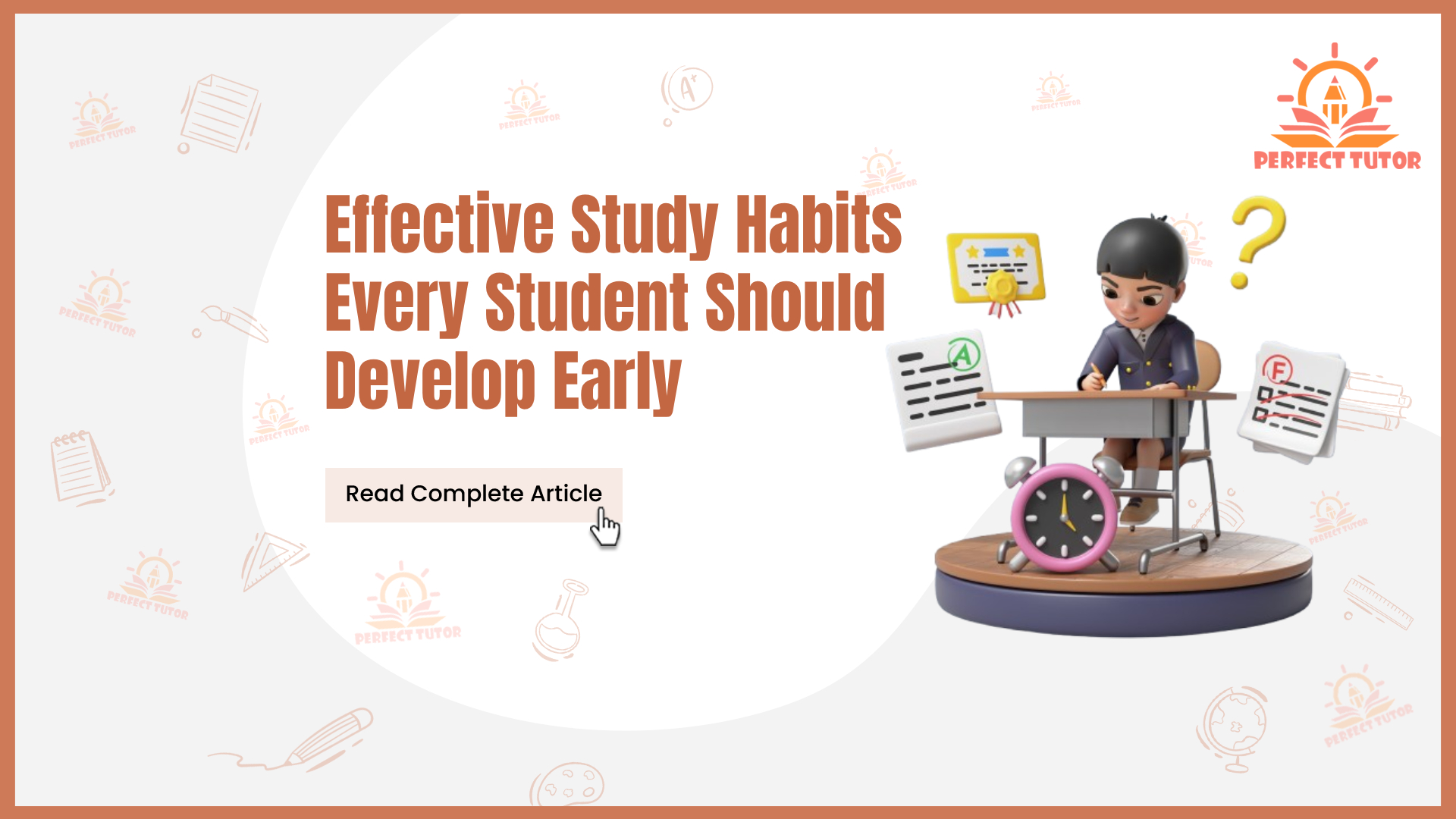Effective Study Habits Every Student Should Develop Early
Effective Study Habits Every Student Should Develop Early
Many students believe that success in school is based solely on intelligence. While natural ability plays a role, it's often not the deciding factor. What truly makes a difference especially over time, are consistent, effective study habits.
Developing good study habits early helps students reduce academic stress, improve performance, and build confidence. These habits serve as the foundation for lifelong learning and personal growth. In this blog, we’ll explore practical and proven study techniques that students of all ages can start using today.
1. The Role of Routine in Academic Success
Establishing a consistent daily routine is one of the simplest yet most powerful habits students can adopt. When students study at the same time every day, their brain begins to associate that time with focus and productivity. Over time, this routine becomes automatic and helps reduce procrastination.
A balanced routine includes time for study, rest, meals, exercise, and hobbies. It’s not about studying for hours without a break—it’s about showing up every day with intention. Even one hour of focused study daily can be more effective than a late-night cramming session.
2. Creating a Productive Study Environment
The right environment can make or break a study session. A quiet, clutter-free space with minimal distractions is ideal. Good lighting, comfortable seating, and organized materials contribute to better concentration.
Encourage students to keep their phone out of reach or on silent mode. Background music or white noise can help some students, while others may prefer complete silence. The key is to create a space where the brain can switch into “learning mode” easily and stay there.
3. Goal-Setting and Planning
Successful students don’t just study—they study with purpose. Goal-setting helps define what needs to be accomplished. Instead of saying “I’ll study math,” a more effective goal would be, “I’ll complete five algebra problems and review yesterday’s notes.”
Planning tools like calendars, study planners, or digital to-do lists can help break tasks into smaller, manageable chunks. This not only makes studying less overwhelming but also gives students a sense of achievement when they check items off their list.
4. Time Management Skills
Time management is a critical skill for academic success. Students who learn how to manage their time early will find it easier to meet deadlines, reduce last-minute panic, and balance school with other activities.
Popular methods like the Pomodoro Technique (25 minutes of focused work followed by a 5-minute break) or the Eisenhower Matrix (categorizing tasks by urgency and importance) can help students stay organized and focused.
Avoiding procrastination is easier when tasks are scheduled in advance. Planning short, focused sessions is more sustainable and productive than marathon study hours.
5. Active Learning Techniques
Passive reading and highlighting alone don’t lead to deep understanding. Active learning strategies help students engage more meaningfully with the material.
Some powerful active learning techniques include:
Summarize what you’ve read in your own words.
Teaching the concept to someone else (Feynman Technique).
Using mind maps and diagrams to visualize ideas.
Practicing with flashcards or quizzes to reinforce memory.
When students actively interact with content, they retain information longer and can apply it more effectively in exams or discussions.
Read This Also - Importance of STEM Education for Children in India
6. Taking Breaks and Practicing Self-Care
The brain needs rest to function at its best. Regular short breaks during study sessions prevent mental fatigue and increase productivity. A 5–10 minute break after every 30–45 minutes of study can do wonders.
Additionally, physical health impacts learning. A well-rested, well-nourished student is more focused and better equipped to retain information. Encourage a balanced diet, adequate sleep (8–10 hours for most students), and daily movement.
Self-care also includes managing stress. Breathing exercises, journaling, or simply spending time outdoors can improve mental clarity and mood.
7. Reviewing and Reflecting Regularly
Studying once and forgetting is common. That's why regular review is essential for long-term retention. Set aside time weekly to go over notes, revisit challenging topics, and assess what’s been learned.
Reflection is another valuable habit. After each study session or test, students can ask themselves:
What worked well?
What didn’t go as planned?
What can I improve next time?
This habit of self-assessment leads to continuous improvement and helps students become independent learners.
8. Asking for Help and Collaborating
No student should feel they have to do everything alone. Asking for help shows maturity and a willingness to learn. Whether it’s a teacher, tutor, or classmate, getting clarification on difficult topics prevents confusion from piling up.
Study groups can also be beneficial when they’re focused and goal-oriented. Explaining concepts to others or hearing different perspectives can deepen understanding. Collaboration builds confidence and teaches valuable teamwork skills.
9. Minimizing Digital Distractions
One of the biggest challenges students face today is staying focused amid constant digital distractions. Social media, messaging apps, and endless notifications can derail even the most disciplined learners.
Using apps like Forest, Focus To-Do, or the Screen Time feature on smartphones can help students stay on task. Encourage designated “tech-free” study hours or use tools that block distracting websites.
Learning to manage technology instead of letting it control them is a habit that will serve students well beyond school.
10. Starting Small and Staying Consistent
Not all habits need to start big. In fact, trying to change everything at once often leads to burnout. It’s better to start with one or two habits—like setting a study time each day or creating a to-do list—and build from there.
Consistency is the most powerful habit of all. It’s okay to have off days or lose focus occasionally. What matters most is getting back on track and sticking with it.
Conclusion
Academic success doesn’t happen in a day, and it doesn’t depend solely on intelligence. The most successful students are those who develop effective study habits early and stick with them consistently.
From setting up the right environment to managing time, setting goals, and reviewing regularly, each habit plays a role in making learning more productive and less stressful. By starting early and staying consistent, students not only improve grades but also build lifelong skills that extend far beyond the classroom.



 +91 8700847275
+91 8700847275
 +1 8009616567
+1 8009616567